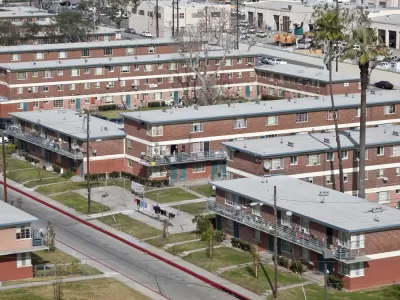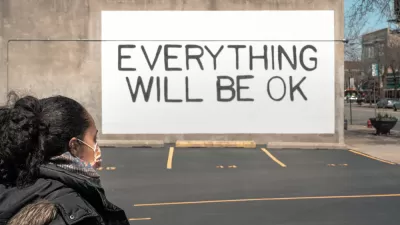The economic disruption of the pandemic has strengthened public support—even among Republicans—for an ambitious social housing program at the federal level, according to the findings of a recent report.

Doug Trumm shares news of "The Case for Social Housing," a report published in November by the Justice Collaborative Institute and written by Daniel Aldana Cohen and Mark Paul.
The report "calls for the federal government to reverse that in a big way and produce twelve million social housing units by 2030, echoing a proposal from Rep. Ilhan Omar (D-Minneapolis)," according to Trumm.
"There has never been a better time to invest in a substantial buildout of social housing,” according to passage selected by Trumm to highlight the arguments of the report. "The A collecting, or waiting for, unemployment benefits. Industrial capacity is running 30% below potential, meaning plenty of factories could be kicked into gear to churn out building essentials."
An earlier article by Kriston Capps also picked up the news of the report, parlaying the report's argument into some informed speculation about the likelihood that the Biden administration might restore the federal government's role in developing social housing—a role mostly abdicated at the federal level since the Regan administration.
According to the report, the coronavirus pandemic has strengthened public support for the idea of the federal government developing social housing. "A recent poll conducted by the Justice Collaborative Institute and the left-leaning policy shop Data for Progress finds that 63% of likely voters support federal investment in social housing," writes Call to summarize the public support claimed in the report. "Some 56% of Republicans said they would support social housing (along with nearly 80% of Democrats)."
According to Capps, the Biden administration will face a narrow window of opportunity to set an agenda amidst a wide variety of needs and multiple crises. According to the report, a large federal investment in social housing could meet multiple needs at once.
FULL STORY: Should Biden Go Big on Public Housing?

Planetizen Federal Action Tracker
A weekly monitor of how Trump’s orders and actions are impacting planners and planning in America.

Maui's Vacation Rental Debate Turns Ugly
Verbal attacks, misinformation campaigns and fistfights plague a high-stakes debate to convert thousands of vacation rentals into long-term housing.

Restaurant Patios Were a Pandemic Win — Why Were They so Hard to Keep?
Social distancing requirements and changes in travel patterns prompted cities to pilot new uses for street and sidewalk space. Then it got complicated.

Charlottesville Temporarily Has No Zoning Code
A judge ordered the Virginia city to throw out its newly revised zoning code, leaving permitting for new development in legal limbo.

In California Battle of Housing vs. Environment, Housing Just Won
A new state law significantly limits the power of CEQA, an environmental review law that served as a powerful tool for blocking new development.

Boulder Eliminates Parking Minimums Citywide
Officials estimate the cost of building a single underground parking space at up to $100,000.
Urban Design for Planners 1: Software Tools
This six-course series explores essential urban design concepts using open source software and equips planners with the tools they need to participate fully in the urban design process.
Planning for Universal Design
Learn the tools for implementing Universal Design in planning regulations.
Heyer Gruel & Associates PA
JM Goldson LLC
Custer County Colorado
City of Camden Redevelopment Agency
City of Astoria
Transportation Research & Education Center (TREC) at Portland State University
Jefferson Parish Government
Camden Redevelopment Agency
City of Claremont





























